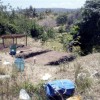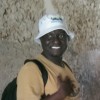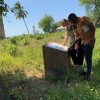This blog completes the second half of the work carried out by Patricia Hart and her team with the different schools in Pangani, July the CONCH project in July 2018.
****************************************************
We spent the best part of the next day at Funguni Secondary school and spoke with 20 teachers in several groups. All were young and enthusiastically received us. None were from Pangani so most were only dimly aware of its cultural heritage.
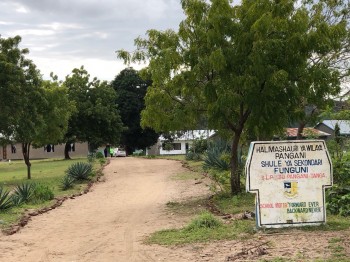
They wanted to know our thoughts on Evolution, unsure of how to equate the “fact” we were descended from chimpanzees with the fact that chimpanzees were in existence who had not become human. Using the web to find pictorial examples I acquainted them with early hominids as well as various recent extinctions. We moved on to discuss the development of Homo sapiens from central East Africa out into the rest of the world. One teacher asked if we could let him have “any historical films” by memory card or stick, which he could use in his class. My thoughts turned to the many BBC productions which would suit his purpose and made a mental note to pursue his request.
Returning to the subject of encouraging a greater awareness of Pangani’s heritage, it soon emerged that were we to write a number of comprehension texts with appropriate questions focusing on trade, historic buildings and even archaeology, they would be very welcomed and used, not only in English lessons, but also in Civics and History classes. Comprehension exercises form an important part of examinations and we were shown exam papers to better understand the standards expected. While the school had 3 computers and two printers, they lacked ink and paper: factors again relevant to our delivery methods.
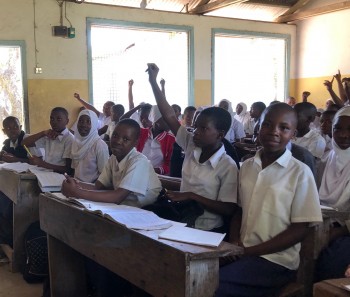
After several hours talking with the teachers, we were invited to speak to one of the classes. Again the class was large, with 3 pupils often squeezed into a desk made for two. We observed for a while as the class was taught how to write a speech; this included their working in groups to produce one. After which, to stimulate discussion, I showed them photos, on my computer, of some of the historic buildings and of the dig in progress, and invited them to the Open Day.
Over the next few days I visited five other schools and made return visits to three of them to deliver the Activity Sheets, discuss how they can be used and to talk with classes. The topics were archaeology, with questions about how an archaeologist might know where to dig; and historic buildings, and what they can tell us about Pangani’s past. From the warmth of our reception, and the breadth of the smiles, the visits were interesting experiences enjoyed by all.
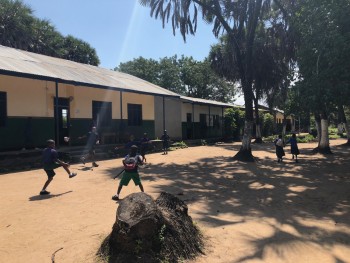
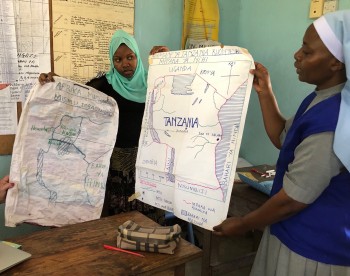
My visit to Choba Primary also resulted in the head deciding to immediately take as many children as two jeeps could carry to visit the site: 22 children saw the excavation !
The poverty of the area is reflected in the schools, and even the teachers who told me they had “all the gadgets,” sat in breeze block classrooms with bare walls. It was clear that any additional teaching materials would be gratefully received, however all schools were eager for comprehension texts and a few posters.
Yes, education in Pangani, and perhaps in Tanzania, as in many places, needs a lot of help ... but the dedication, enthusiasm and passion of the teachers we met is second to none.

